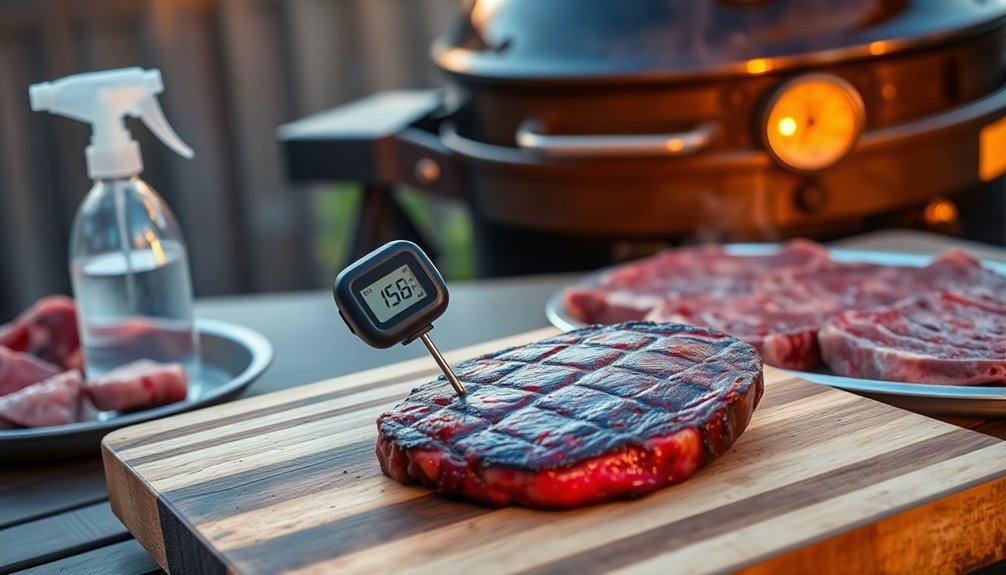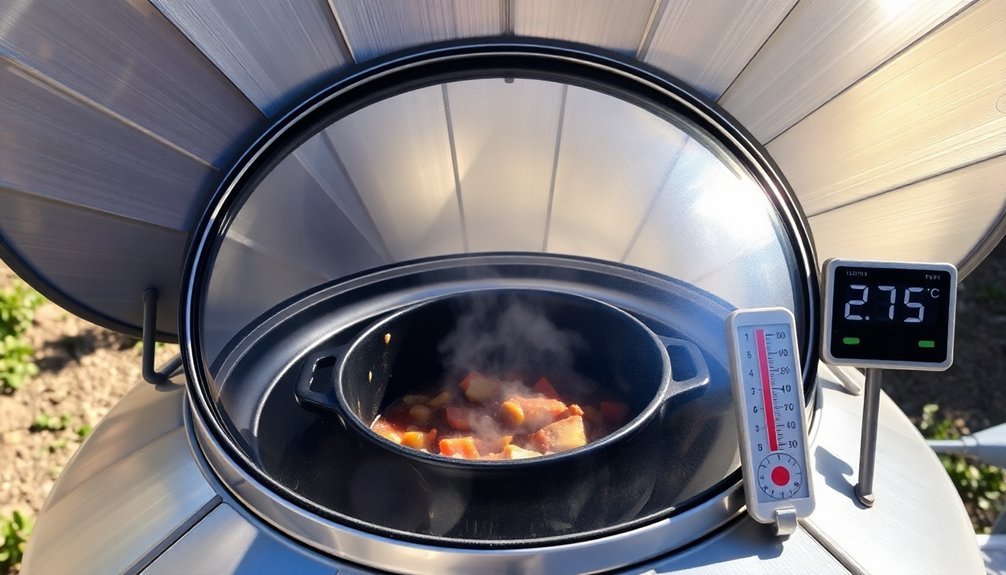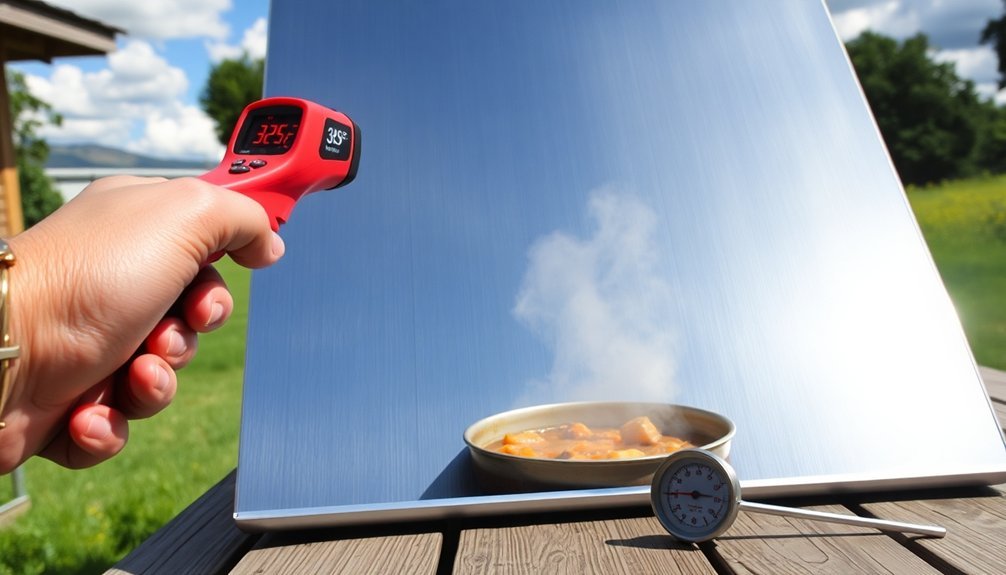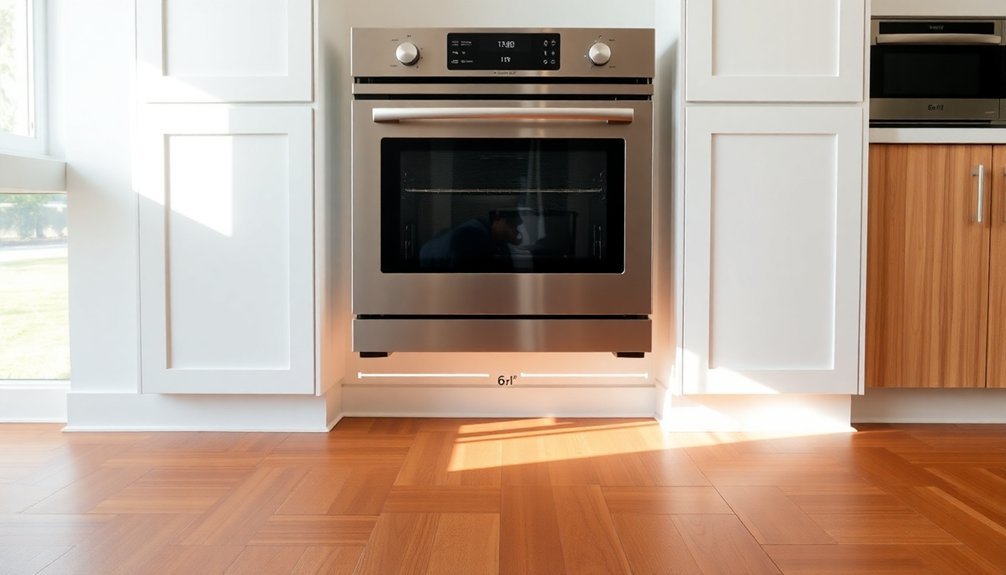To safely cook meat outdoors, you'll need to master three essential steps. First, thaw your meat properly in the refrigerator or cold water bath – never on the counter where bacteria can flourish. Second, verify your grilling equipment is clean by preheating the grates and scrubbing them with soapy water to remove harmful residues. Third, always use a reliable meat thermometer to check internal temperatures: 145°F for whole cuts, 160°F for ground meats, and 165°F for poultry. Following these vital safety measures will keep your outdoor cooking both safe and delicious, with many more expert techniques to explore.
Proper Meat Thawing Methods

When it comes to preparing meat for outdoor cooking, proper thawing is essential for both safety and quality. You've got three safe methods to choose from: refrigerator, cold water, or microwave thawing.
The refrigerator method is your safest bet, taking 10-24 hours for most cuts, with larger pieces needing 24 hours per 5 pounds. Place raw meat at the bottom of your fridge, below ready-to-eat foods. Using clean bowls or pans to catch dripping juices will help prevent cross-contamination with other foods.
If you're short on time, try cold water thawing, which takes 1-3 hours. Just keep the meat in a leak-proof package and change the water every 30 minutes.
For last-minute needs, microwave thawing works in about 10-15 minutes, but you'll need to cook the meat immediately.
Never thaw meat on the counter or in hot water, as bacteria multiply quickly between 40-140°F.
Clean Grilling Equipment First
Now that your meat is properly thawed, a clean grill guarantees both food safety and ideal flavor. Start by heating your grates on high for 5 minutes to burn off residues, then scrub them with a firm-bristled grill brush.
For deeper cleaning, remove the grates and wash them with a mixture of warm water, dish soap, and baking soda.
You'll want to tackle built-up grease by letting your grill run hot for 15 minutes after each use. For stubborn grime, try steaming with water in a metal tin or applying vinegar solution. Consider using an old onion half while scrubbing to help break down grease naturally.
Don't forget to maintain your grill's exterior with a gentle cleaning solution and soft cloth, avoiding abrasive materials on stainless steel surfaces.
Keep the interior "seasoned" by not over-cleaning, and remember to check fuel lines and ignition systems annually.
Check Internal Temperature Always

Checking your meat's internal temperature stands as the most critical step for both food safety and ideal results.
You'll need a reliable meat thermometer to guarantee your proteins reach safe temperatures while maintaining their best texture and flavor.
Insert your thermometer into the thickest part of the meat, avoiding bones and fat. For beef, pork, lamb, and veal steaks or chops, aim for 145°F with a 3-minute rest period. Ground meats need to reach 160°F, while all poultry requires 165°F.
When cooking whole birds, check multiple spots including the innermost thigh, wing, and breast. Undercooked meat can harbor dangerous bacteria like Salmonella and E. coli.
Don't skip the resting period – it's essential for food safety and juiciness. If you're making pulled pork, you'll want to reach about 204°F to properly break down the connective tissue.
Frequently Asked Questions
How Long Can Marinated Meat Stay in the Refrigerator Before Grilling?
You shouldn't marinate beef, pork, or lamb for more than 2-3 days in your refrigerator. For best results, you'll want to keep denser steaks at 24 hours maximum to avoid tough or mushy texture.
What Should I Do if It Starts Raining While I'm Grilling?
Keep your grill's lid closed to maintain temperature and prevent water from getting in. If you're using an electric grill, stop immediately. You can move under a covered area or use a BBQ canopy for protection.
How Far Should the Grill Be Placed From Buildings or Structures?
You'll need to place your grill at least 10 feet away from any buildings, structures, decks, or garages. This applies to gas, charcoal, and electric grills to maintain proper fire safety standards.
Can I Reuse Marinade That Was Used on Raw Meat?
Don't reuse marinade that's touched raw meat unless you boil it first to kill harmful bacteria. You're better off setting aside unused marinade before marinating or making a fresh batch for basting.
How Do I Properly Extinguish Hot Coals After Grilling Is Finished?
Close your grill's lid and vents to cut off oxygen. You can also carefully transfer hot coals to a metal trash can with lid. Don't pour water directly on grill coals, as it creates dangerous steam.
In Summary
You'll prevent foodborne illness by following these three essential outdoor cooking tips. Always thaw meat gradually in your refrigerator, never on the counter. Don't forget to scrub those grill grates thoroughly before each use to avoid contamination. Most importantly, you're not done cooking until you've checked the internal temperature with a meat thermometer. These simple steps will keep your outdoor cooking safe and enjoyable.





Leave a Reply